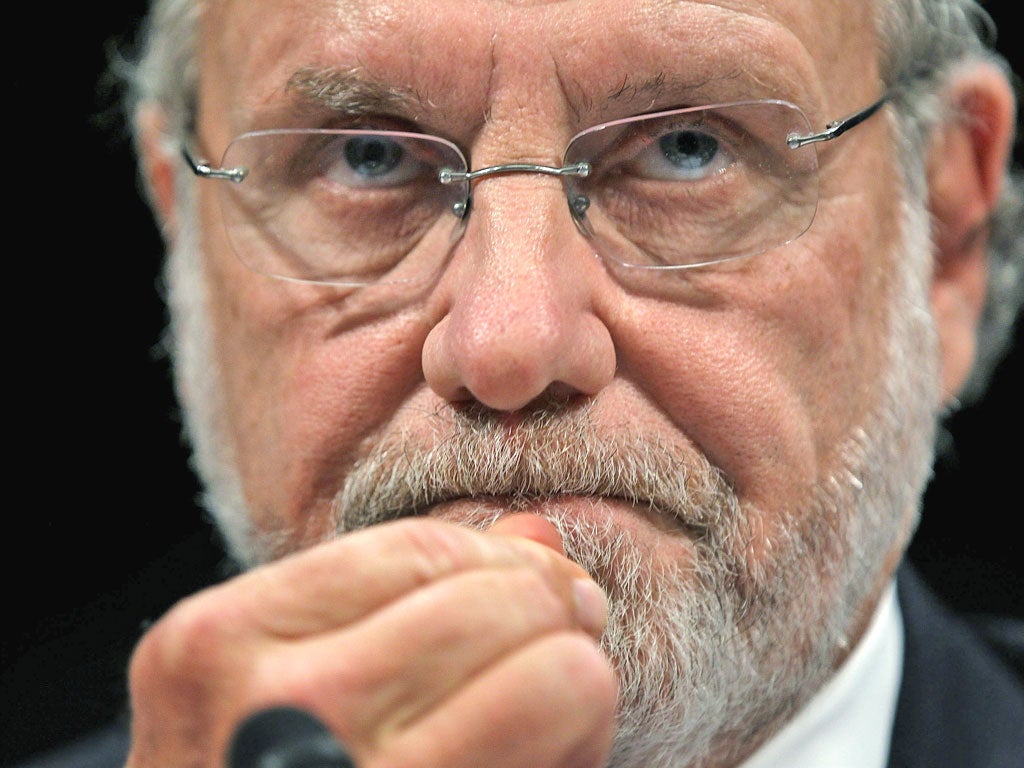The twisted tale of MF funds
Former boss Jon Corzine has been castigated over a missing $1.6bn – but it seems he has been framed

It sounded for all the world like a smoking gun. A Congressional investigation into the collapse of MF Global, a commodities broker whose demise last year left thousands of customers out of pocket to the tune of $1.6bn (£1bn), appeared to have unearthed evidence that knowledge about where the missing money went goes right to the top.
MF Global's former chief executive Jon Corzine, the Obama campaign donor and ex-boss of Goldman Sachs, "OKed MF fund transfer, probe finds", according to the first headlines. "Damning email ties Corzine to funds", said another, as the story took wing. "Memo contradicts Corzine testimony." "Corzine authorised raid of customer funds". Victims demanding criminal charges over the MF Global debacle, and cynics who called Mr Corzine "too big to jail", were cock-a-hoop.
The accusation is that a $200m transfer out of customer accounts, which was used to pay off an overdraft in MF Global's London arm, was carried out as "per JC's direct instructions". But Mr Corzine was framed.
The story of MF Global's collapse into bankruptcy last October and the reasons why, for the first time ever, supposedly ring-fenced customer funds disappeared turns out to be more complex than the plot of a Hercule Poirot novel – as will be evident when the House of Representatives Financial Services Committee calls some more of the key players to testify this afternoon.
MF Global was meant to be Mr Corzine's triumphant return to Wall Street. But his plan to turn the sleepy brokerage, once owned by the UK's Man Group, into a mini-Goldman was built on giant bets using MF Global's own money and disaster struck when the eurozone debt crisis caused those bets to turn sour.
With his reputation already in tatters – and his luxury apartment on the market for $2.9m to fund his legal bills – things can only get worse if he is charged with any wrongdoing. The FBI, industry regulators and Congress are all investigating if he was reckless in putting on those $7.7bn of eurozone bets, or if improper in the disclosures made to investors, or if – worst of all – there was criminality by anyone who dipped into customer accounts in those desperate October days, when executives were hoping to keep MF Global afloat long enough to sell it to another broker.
Mr Corzine's testimony, at a Congressional hearing in December, is that he never ordered – and never would have ordered – any misuse of customer funds and that he was "shocked" to discover there was a shortfall. Other executives have added that, amid the chaos of a "run" on the broker, their assumption was that any discrepancies in customer accounts were the result of paperwork delays.
Last month, James Giddens, the trustee in charge of liquidating MF Global, set out in graphic detail the chaos of those last few days.
"The number of transactions executed by MF Global during the last week prior to the bankruptcy escalated to unprecedented volumes. The rush to meet funding needs for collateral, margin and customer liquidations led to billions of dollars in securities sales, draws on credit facilities, and a web of inter-company loans across affiliates, some foreign. The company's computer systems and employees had difficulty keeping up with the unprecedented volume of transactions."
Computer systems failed and no-one, it appears, had the full picture, and things are greyed further by the fact that customer accounts contain not just customer money but also a buffer of cash belonging to MF Global. Some of the money can be routinely and illegally used by the broker itself. It took Mr Giddens more than three months of forensic accounting to fix the approximate shortfall in customer accounts at $1.6bn.
It is in this context that Mr Corzine ordered the $200m transfer to cover repayment of a $175m overdraft, as was being demanded by JPMorgan Chase in London. The person who made that transfer was a treasurer in the Chicago office called Edith O'Brien. It is her email that was granted "smoking gun" status by the headlines of recent days.
According to the House Financial Services Committee: "Ms O'Brien wrote in an email that the transfer was 'Per JC's direct instructions'."
The committee did not publish the full email, however, so it is not possible to infer that Mr Corzine's instruction was to use cash from the customer accounts, let alone dip into customers' own money. Mr Corzine's spokesman said he did not make such an instruction and was never told where the cash came from.
The quoted fragment, and the response it generated, amounted to a framing of Jon Corzine. It has heated up interest in today's hearing, as intended by the committee, but it hasn't changed the smoke signals coming from the FBI investigation, which have so far suggested that criminal charges are unlikely.
Ms O'Brien, who has testified to Congress as an expert on commodities brokers on occasion, is keeping mum, having reportedly refused to co-operate without immunity from prosecution. The committee expects her to invoke the Fifth Amendment and refuse to answer questions today.
Other witnesses include MF Global's chief financial officer and general counsel. They may shed more light on the chaotic final days, but they may also show that anyone thinking about the $1.6bn shortfall as a "whodunnit" isn't thinking about it right.
Join our commenting forum
Join thought-provoking conversations, follow other Independent readers and see their replies
Comments
Bookmark popover
Removed from bookmarks